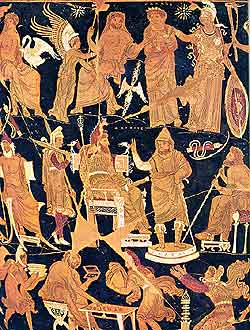First performed in the Theatre of
Dionysos in Athens in 472 B.C. it is the earliest surviving Greek tragedy.
This is also the only surviving play on contemporary events rather than
mythology and legend. The battle of Salamis was fought only eight years
earlier. It must be presumed that many, perhaps even most of the first
audience were men who had themselves participated in or witnessed the
battle. This was not the only play on contemporary events, two earlier
plays were by Phrynichus and at least one of these probably influenced
Aeschylus in writing The Persians. Aeschylus had ties to Sicily
where he visited twice and where he died. In about 476 B.C., Aeschylus
wrote The Women of Etna for production in Syracuse. The Persians
was revived in Syracuse by Aeschylus a few years after its initial production
in Athens. Consequently, The Persians is also the first tragedy
known to have been performed more than once in the lifetime of the author.
The democratic leader, Pericles, was the choregos, or producer,
of The Persians.

The Persians by another playwright